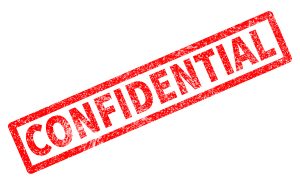
This week, our free MFT Law and Ethics exam and LCSW Law and Ethics exam practice question will focus on the topic of client confidentiality. Confidentiality is a key component of the therapeutic relationship. Without it, therapists would likely learn very little from their clients and it would substantially limit what could be achieved through psychotherapy. As therapists, we want our clients to feel safe in sharing the most intimate details of their life; information they may not feel comfortable disclosing to anyone else. Yet, confidentiality is not without limits.
How Will Confidentiality Show Up on the Exam?
The issue of confidentiality is so important to our profession that you are guaranteed to see questions about the topic on your MFT Law and Ethics exam, LCSW Law and Ethics exam, or your Clinical exam. So how can this confidentiality be tested? Following are just a few examples of how this subject can be tested:
- What are our reporting requirements regarding child or elder/dependent abuse and neglect?
- What are permitted exceptions to confidentiality and what should we do in these instances?
- How do we manage confidentiality when engaging in group, family, or couples work
Let’s see how you do on this week’s FREE practice question regarding confidentiality.
Practice Question:
A therapist has been working with a 19-year-old female client who was brought to therapy five years earlier for an eating disorder. When the client began therapy, her parents consented to treatment and engaged in numerous collateral sessions with the individual therapist. The family also participated in ongoing family therapy. Following a sustained period of symptom stabilization, the mother calls the therapist because she is concerned the daughter is exhibiting troubling behaviors. She asks the therapist if the daughter specifically discussed regressive behaviors in recent sessions. How should the therapist respond?
A. Inform the mother that the daughter is legally an adult and the therapist must maintain confidentiality
B. Inform the mother that the daughter is legally an adult and she can only provide information the client has authorized the therapist to share
C. Break the client’s confidentiality if the therapist believes the client is engaging in regressive behaviors
D. Break the client’s confidentiality if the therapist is concerned for the client’s safety
The correct answer is B.
- You were likely to get the answer down to two, and answer A was probably in the running for the best answer--if not the answer you ultimately chose. However, answer A is incomplete and should be eliminated. The first part of answer A is correct, the daughter is legally considered an adult. However, the parents have historically been involved in her treatment and this answer excludes the possibility of sharing any information--it is too extreme.
- Answer C is an easier answer choice to eliminate. While therapists are legally permitted to break confidentiality in certain instances, a client engaging in regressive behaviors (too vague a term) is not one of those instances.
- Answer D is another possible choice, and it is true a therapist is legally permitted to break confidentiality if a client is a danger to themselves. However, there is nothing in the question stem to indicate safety concerns severe enough to warrant breaking confidentiality.
- Answer B is the strongest answer choice. The first part of the answer is correct; the client is legally considered an adult and has a right to confidentiality. The second part of the answer acknowledges the therapist may share information with the parents, but disclosures are limited based on the scope of the authorization signed by the client.
Exam Preparation
Which answer did you choose? Does the rationale fit with your understanding of the topic and how you would apply it in a clinical setting? Or did you learn something new with this scenario? If you have any further questions feel free to check in with a TDC coach. We are here to support you all along the way. And if you came up with the same answer-great job! You are on the right track to getting licensed.
Still haven’t signed up for an exam preparation program? Or have you already passed the exam and need to complete your continuing education requirements? Our structured, straightforward approach will provide you with exactly what you need!
